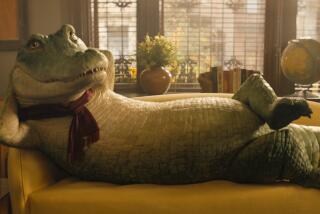KID CREOLE TO BOW WITH ‘THE MIKADO’
- Share via
Roll over, Gilbert & Sullivan; Kid Creole is taking on “The Mikado.”
August Darnell--who in his semimythical role of Kid Creole led listeners through a dizzying, tropical dance-music brew and winding storylines in the first four Kid Creole & the Coconuts albums--is finally taking the step that’s been implied in all his undertakings, from the disco-swing of Dr. Buzzard’s Original Savannah Band in the late ‘70s through the new “In Praise of Older Women and Other Crimes” album.
Darnell, who will be fronting Kid Creole & the Coconuts tonight and Saturday at the Palace, has been working with producer-director Joseph Papp on a Latin-flavored rearrangement of the Gilbert & Sullivan score, plus some new lyrics to accommodate the story’s relocation from Japan to Cuba. Darnell plans to premiere “El Jefe” (“The Chief”) next spring, then move on to his ultimate goal.
“After that, I want to do a full-blown musical for the screen,” said Darnell, taking a break from watching “The Searchers” on TV in his Manhattan apartment for a phone interview this week.
“Not like the modern-day musical,” he added. “Not like what’s become of the musical. The ‘Footloose’- and ‘Flashdance’-type stuff doesn’t turn me on. It’s a youth-culture thing. It’s like junk food: It sells and it’s good for the time, but I don’t think it has any staying power.”
Darnell may favor mainstream classics like “My Fair Lady” and “The King and I,” but his eclectic sound and image look forward as much as back. A mulatto Cole Porter in a zoot suit--or sometimes a pith helmet--the Bronx-born singer-writer-arranger spices his urbane wit with a street-level hipness and animates his music with primarily Latin rhythms. He’s called on everything from calypso and reggae to Tyrolean brass band to frame the long-running recorded odyssey of the Kid’s voyage in search of his true love.
Darnell “closed the book on that myth” in a 90-minute television special made and aired in England. “There’s Something Wrong in Paradise” featured music from Creole albums as well as new songs written especially for the production. But Darnell had bad news for America’s Creole connoisseurs: There are no current plans for U.S. airing or distribution.
That’s not surprising, because America usually gets the short end when it comes to Kid Creole. Aside from isolated successes, the records have sold poorly here, and the populous band--including horn section and the Coconuts vocal trio--isn’t even able to bring its elaborate beachfront-clubhouse stage set west for the Palace shows.
“That’s my only regret,” said Darnell. “That’s always been the case. Every tour I do overseas we have a fabulous set, then we come to America and we can’t use it due to the cost factor. That’s frustrating to me.
“Thank God for Europe. It’s really kept us afloat. The pay over there is enormous, and we’re more popular there too. . . . Ever since we played our first dates in Paris, I realized we were going to win audiences not through the vinyl, but through the live appeal. So we kept going back to Europe till we had a following based primarily on the spectacle of the live shows.
“In America, we’ve only done the major cities. We haven’t done the heartland yet. I’ve always felt that that major tour will be the way to bust America open; once the audience sees it, they feel more comfortable with the music.”
But while Darnell feels frustrated, he says he’s in no way discouraged.
“We play in Barcelona for 75,000 people, then we come to America and we’re booked in halls for 1,000, and sometimes we don’t even fill that, so the contrast is strange. But I feel it’s going to happen. I feel I’m in no way losing it, so to speak; 99% of it is perseverance. I’m not a quitter. It’s just a question of sticking to your guns, not compromising too much.
“I’ve been tempted to make things more commercial. I’ve always stopped because I had this great fear that after compromising it wouldn’t change anything, and then I would have lost my soul. . . . So I declined to do it for that reason--fear, more than anything else, of losing myself.”
More to Read
The biggest entertainment stories
Get our big stories about Hollywood, film, television, music, arts, culture and more right in your inbox as soon as they publish.
You may occasionally receive promotional content from the Los Angeles Times.









